#The Fourteenth Amendment
Text
📈 Exclusion of Donald Trump from future ballots under Fourteenth Amendment hit 2,000 signers! https://resist.bot/petitions/PGOQGM
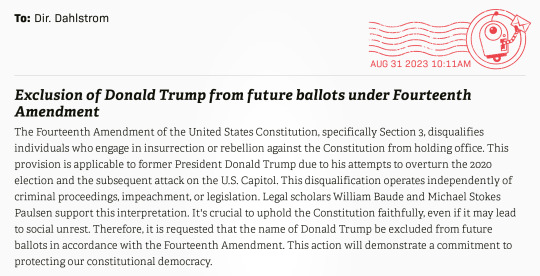
The Fourteenth Amendment of the United States Constitution, specifically Section 3, disqualifies individuals who engage in insurrection or rebellion against the Constitution from holding office. This provision is applicable to former President Donald Trump due to his attempts to overturn the 2020 election and the subsequent attack on the U.S. Capitol. This disqualification operates independently of criminal proceedings, impeachment, or legislation. Legal scholars William Baude and Michael Stokes Paulsen support this interpretation. It's crucial to uphold the Constitution faithfully, even if it may lead to social unrest. Therefore, it is requested that the name of Donald Trump be excluded from future ballots in accordance with the Fourteenth Amendment. This action will demonstrate a commitment to protecting our constitutional democracy.
▶ Created on August 25 by @resistbot Action Fund · 2,029 signers in the past 7 days
Text Sign PGOQGM to WhatsApp / Messenger / APPLE MESSAGES / SMS
#ivy speaks#The Fourteenth Amendment#United States Constitution#insurrection#rebellion#disqualification#holding office#Donald Trump#overturn#2020 election#U.S. Capitol#criminal proceedings#impeachment#legislation#legal scholars#uphold#social unrest#future ballots#commitment#constitutional democracy#August 25#jan 6#dir. dahlstrom#open letter#resistbot#democracy#coup attempt#leftists#democratic party#intersectional activism
7 notes
·
View notes
Text
Republicans really hate the 14th Amendment for so many reasons.
2 notes
·
View notes
Photo
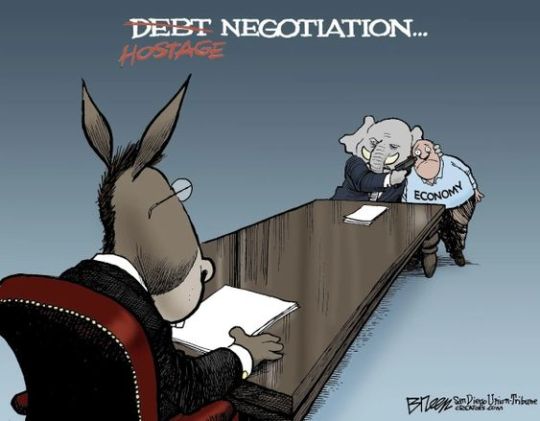
LETTERS FROM AN AMERICAN
May 17, 2023
HEATHER COX RICHARDSON
MAY 18, 2023
The debt ceiling crisis is already affecting our national security. Because President Biden has pulled out of his trip to Australia so he can come home to address the crisis, a planned meeting of the Quad will not go forward. The Quad, whose official name is the Quadrilateral Security Dialogue, is a security group consisting of Australia, India, Japan and the United States that organized in 2007 as a response to China’s rising power.
Biden’s visit to Australia and to Papua New Guinea was designed to cement the interest of the U.S. in the Indo-Pacific region. Daniel Hurst of The Guardian was quite clear what it meant to have Biden forced to cancel because of the Republicans’ debt ceiling demands. His article on the issue was titled: “The cancelled Quad summit is a win for China and a self-inflicted blow to the US’s Pacific standing.” “Chinese state media outlets won’t need to muster much creative energy to weave together some of Beijing’s preferred narratives,” Hurst wrote, “that the US is racked by increasingly severe domestic upheaval and is an unreliable partner, quick to leave allies high and dry.”
In the Sydney Morning Herald, Matthew Knott called Biden’s forced withdrawal “a disappointment, a mess and a gift to Beijing.” “The US wants to remain the leader of the free world but domestic divisions mean it now regularly struggles to keep its government from shutting down and defaulting on its debts,” he wrote. “The Quad summit in Sydney should have provided a powerful symbol of four proud democracies working together to get things done. Instead, it will serve to highlight the systemic problems plaguing the world’s longest-standing democracy and its aspirations for ongoing global leadership.”
And, astonishingly, stepping on this global rake is an unforced error. The debt ceiling is not about future spending, it is about paying bills Congress has already incurred. If it comes to that, failing to raise the debt ceiling—the amount of money the Treasury can borrow to meet its obligations—so that Republicans, led by House Speaker Kevin McCarthy (R-CA), can get concessions they cannot win through normal legislative procedures, will be an unforced error of truly epic proportions, a larger version of undercutting years of work building U.S. standing in the Indo-Pacific region.
Senate Democrats have begun to push for honoring the nation’s debts without trying to bring Republicans along. They are circulating a letter urging President Biden to invoke the fourth section of the Fourteenth Amendment to override the debt ceiling. That section reads: “The validity of the public debt of the United States, authorized by law, including debts incurred for payment of pensions and bounties for services in suppressing insurrection or rebellion, shall not be questioned.”
Republican congressmen wrote that section to prevent Democratic opponents, who hated the newly powerful government that had won the Civil War, from changing the terms of repayment of the debt. Democrats called for turning gold interest payments into payments in paper money. That change would have significantly degraded the value of the debt. It would also have destroyed confidence in the government, a result those who had just lost the Civil War quite liked.
Congress intended the Fourteenth Amendment to assert the power of the federal government over the states once and for all, making sure that no one could discriminate against individuals within the states or make war on the United States from within. It was an attempt to make it impossible for those trying to destroy the nation to carry out their plans.
Senator Peter Welch (D-VT) told Burgess Everett and Sarah Ferris of Politico, “It’s not about being comfortable with Biden or anyone else. It’s about the House. Kevin’s in shackles. He’s in leg, arms and hand cuffs. And frankly I don’t think he’s got much capacity to negotiate. And very little capacity to advance a deal.” Welch, who served eight terms in the House before moving to the Senate in 2023, added, “I’m quite pessimistic about McCarthy. He’s very constrained…. I think we’re heading toward a decision on the 14th Amendment.”
Interestingly, Senator Josh Hawley (R-MO) has indicated he’s on board with the idea of Biden invoking the Fourteenth Amendment. “I think if I were president, I would be tempted” to use the Fourteenth Amendment, Hawley said. “Because I would just be like, ‘Listen, I’m not gonna let us default. So end of story. Y’all will do whatever you want to do.’ But I’m not necessarily giving him that advice. It’s against my interest.” Hawley’s defense of the idea suggests that Republicans are eager to find a solution to the crisis that does not involve them, so that they can then condemn the Democrats for whatever they do.
—
LETTERS FROM AN AMERICAN
HEATHER COX RICHARDSON
8 notes
·
View notes
Text
1 note
·
View note
Text
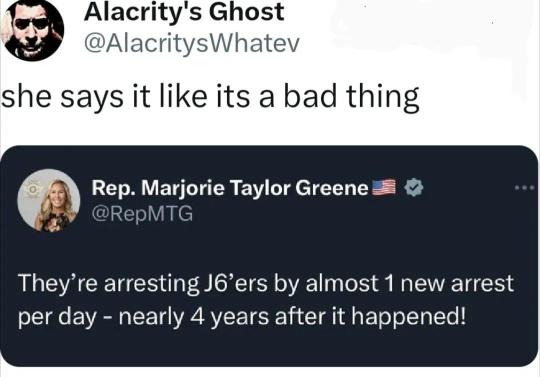

I think the rioters thought if they didn't manage to overthrow the election, they would just go home to their Hallmark channel existence and nothing would happen. Consequences weren't for them.
2K notes
·
View notes
Photo
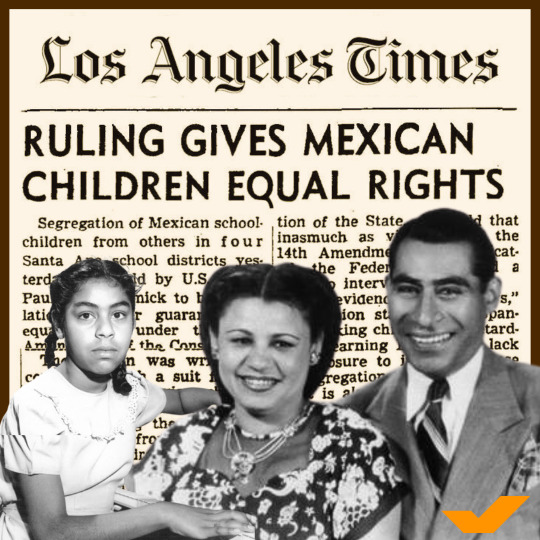
When farmers Gonzalo and Felicitas Mendez sent their children to a local California school in 1945, school officials said they had to go to a separate facility reserved for Mexican American students. Angered by this discrimination, the Mendez family recruited other immigrant parents for a federal court case challenging the school segregation.
On this day 77 years ago, a Circuit Court made a final ruling in their favor — stating segregated education denied the Mexican American students their equal protection rights under the 14th Amendment.
The Mendez v. Westminster decision paved the way for the landmark Brown v. Board of Education case in 1954, and is a clear example of Mexican Americans fighting for their rights — and winning. 🙌🏽
#mendez v westminster#brown v board of education#california#14th amendment#fourteenth amendment#mexican americans#immigrant rights#mexican american rights#school segregation#segregation#history
37 notes
·
View notes
Text
14th Amendment Section 3
Now, I'm no lawyer. My main interaction with the law has been trying to avoid it, but I have thoughts:
People and pundits are pooh-poohing the findings of Colorado and Maine courts, now joined by Illinois, that determined Trump was disqualified from their ballots by violating Section 3 of the 14th Amendment. In their minds, no state-level action should be allowed to play such a large role in a national election.
But Section 3 of the 14th has been in the Constitution so revered by conservatives for over 150 years. The three states mentioned had trials heard by judges where all parties could present their case. All three found Trump had violated the terms of Section 3. The law is clear, he must be disqualified.
If the conservatives can feel entitled to disregard an article of the Constitution to serve their needs, I suggest others can take a more nuanced look at other Amendments. Perhaps the Second? Maybe we can disregard any interpretation of it that allows possession of firearms wily-nilly?
Good for the goose, sauce for the gander.
29 notes
·
View notes
Text
smthin smthin nu!who's journey of the doctor and earth as home
nine's continued discomfort with "the domestic"
ten staying with the tylers' over christmas and then resisting the same with donna after losing rose/that life, and that continuing throughout knowing martha, then, later still getting to know wilf and leaving donna at her home before cutting ties with everyone from that life
eleven for a brief time living with the ponds, but with one step inside the tardis the whole time, and briefly going to clara's one christmas
twelve barely getting involved in clara's home life at all, but then with bill going back to the idea of family in a sort of tentative cautious kind of way? -- taking a picture of her mum for her, helping her move into her (briefly) held accommodation, and generally being read as bill's grandfather/family
thirteen meeting yaz' family and being asked if they're dating, and travelling with multiple generations of a family for some time (echoing rose and jackie and mickey, donna and wilf, the ponds + rory's dad), and possibly having some very conflicting feelings about leaving especially yaz behind
fourteen staying with the noble family
#i think... it is interesting... Telling even perhaps... that martha never had this.... telling in the sense that martha deserves better#ten DID of course meet martha's family but their whole memory of everything is: horror fear torture bad horror bad#not that martha now would want a domestic involvement with the doctor but oof... oh she hit brick walls every time didnt she#wherever martha is fourteen and/or fifteen should make some kind of amends#not that the events of the doctor's daughter was ten's fault but man#martha never caught a break did she#doctor who#dw#doctor who spoilers#dw spoilers#the doctor#the tenth doctor#the eleventh doctor#the twelfth doctor#the thirteenth doctor#the fourteenth doctor#no analysis of nu!who is complete without going *AND MARTHA'S STORY IN ALL THIS!*
34 notes
·
View notes
Text
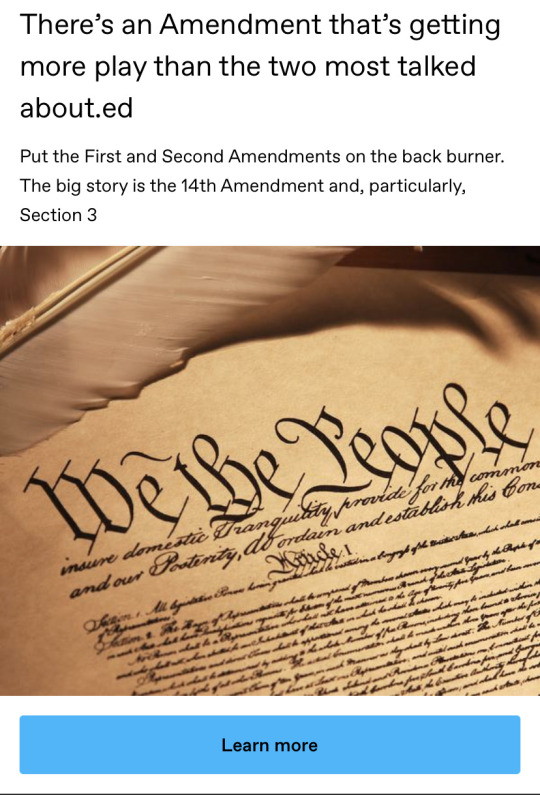
ads you would see on charles sumner 1868 tumblr
#not even why are they advertising the fourteenth amendment#why are they advertising it to ME. i once got banned from mentioning anti-imperialist uses of the reconstruction amendments at dinner#i know this thing inside and out
35 notes
·
View notes
Text
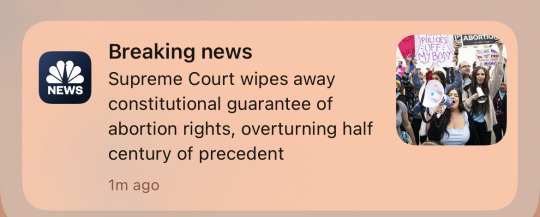
And there it is.
And we’re supposed to just keep going as if nothings wrong
As if rights aren’t being ripped away by right wing nuts
I hate it here
#scotus#the supreme court#roe v wade#fuck the supreme court#fuck the gop#abortion rights#abortion#her body her choice#fourteenth amendment
200 notes
·
View notes
Text

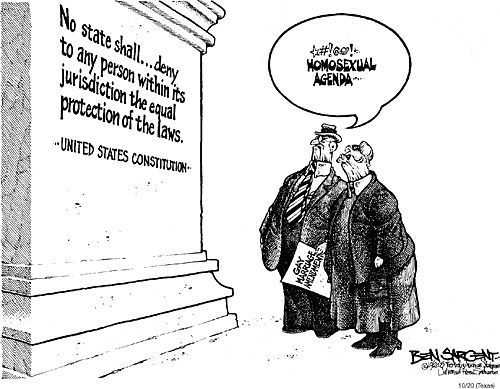
#US Constitution#Fourteenth Amendment#Marbury vs Madison#Constitutional Law#cartoon#editorial cartoon
11 notes
·
View notes
Link
1 note
·
View note
Text

[Clay Jones]
* * * *
LETTERS FROM AN AMERICAN
March 30, 2024
HEATHER COX RICHARDSON
MAR 31, 2024
On Tuesday morning, on his social media outlet, former president Trump encouraged his supporters to buy a “God Bless The USA” Bible for $59.99. The Bible is my “favorite book,” he said in a promotional video, and said he owns “many.” This Bible includes the U.S. Constitution, the Bill of Rights, the Declaration of Independence, and the Pledge of Allegiance. It also includes the chorus of country music singer Lee Greenwood’s song “God Bless the USA,” likely because it is a retread of a 2021 Bible Greenwood pushed to commemorate the twentieth anniversary of 9-11.
That story meant less coverage for the news from last Monday, March 25, in which Trump shared on his social media platform a message comparing him to Jesus Christ, with a reference to Psalm 109, which calls on God to destroy one’s enemies.
This jumped out to me because Trump is not the first president to compare himself to Jesus Christ. In 1866, President Andrew Johnson famously did, too. While there is a financial component to Trump’s comparison that was not there for Johnson, the two presidents had similar political reasons for claiming a link to divine power.
Johnson was born into poverty in North Carolina, then became a tailor in Tennessee, where he rose through politics to the U.S. House of Representatives and then the Senate. In 1861, when Tennessee left the Union, Johnson was the only sitting senator from a Confederate state who remained loyal to the United States. This stand threw him into prominence. In 1862, President Abraham Lincoln named him the military governor of Tennessee.
Then, in 1864, the Republican Party renamed itself the Union Party to attract northern Democrats to its standard. To help that effort, party leaders chose a different vice president, replacing a staunch Republican—Hannibal Hamlin of Maine—with the Democrat Johnson.
Although he was elected on what was essentially a Republican ticket, Johnson was a Democrat at heart. He loathed the elite southern enslavers he thought had become oligarchs in the years before the Civil War, shutting out poorer men like him from prosperity, but he was a fervent racist who enslaved people himself until 1863. Johnson opposed the new active government the Republicans had built during the war, and he certainly didn’t want it to enforce racial equality. He expected that the end of the war would mean a return to the United States of 1860, minus the system of enslavement that concentrated wealth upward.
Johnson was badly out of step with the Republicans, but a quirk of timing gave him exclusive control of the reconstruction of the United States from April 15, 1865, when he took the oath of office less than three hours after Lincoln breathed his last, until early December. Congress had adjourned for the summer on March 4, expecting that Lincoln would call the members back together if there were an emergency, as he had in summer 1861. It was not due to reconvene until early December. Members of Congress rushed back to Washington, D.C., after Lincoln’s assassination, but Johnson insisted on acting alone.
Over the course of summer 1865, Johnson set out to resuscitate the prewar system dominated by the Democratic Party, with himself at its head. He pardoned all but about 1,500 former Confederates, either by proclamation or by presidential pardon, putting them back into power in southern society. He did not object when southern state legislatures developed a series of state laws, called Black Codes, remanding Black Americans into subservience.
When Congress returned to work on December 4, 1865, Johnson greeted the members with the happy news that he had “restored” the Union. Leaving soldiers in the South would have cost tax money, he said, and would have “envenomed hatred” among southerners. His exclusion of Black southerners from his calculus, although they were the most firmly loyal population in the South, showed how determined he was to restore prewar white supremacy, made possible by keeping power in the states. All Republican congressmen had to do, he said, was to swear in the southern senators and representatives now back in Washington, D.C., and the country would be “restored.”
Republicans wanted no part of his “restoration.” Not only did it return to power the same men who had been shooting at Republicans’ constituents eight months before and push northerners’ Black fellow soldiers to a form of quasi-enslavement, but also the 1870 census would count Black Americans as whole people rather than three fifths of a person, giving former Confederates more national political power after the war than they had had before it. Victory on the battlefields would be overturned by control of Congress.
Congressional Republicans rejected Johnson’s plan for reconstruction. Instead, they passed the Fourteenth Amendment in June 1866 and required the former Confederate states to ratify it before they could be readmitted to the United States. The Fourteenth Amendment put the strength of the national government behind the idea that Black Americans would be considered citizens—as the Supreme Court’s 1857 Dred Scott decision had denied. Then it declared that states could neither discriminate against citizens nor take away a citizen’s rights without due process of the law. To make sure that the 1870 census would not increase the power of former Confederates, it declared that if any state kept men over 21 from voting, its representation in Congress would be reduced proportionally.
Johnson hated the Fourteenth Amendment. He hated its broad definition of citizenship; he hated its move toward racial equality; he hated its undermining of the southern leaders he backed; he hated its assertion of national power; he hated that it offered a moderate route to reunification that most Americans would support. If states ratified it, he wouldn’t be able to rebuild the Democratic Party with himself at its head.
So he told southern politicians to ignore Congress’s order to ratify the Fourteenth Amendment, calling Congress an illegal body because it had not seated representatives from the southern states. He promised white southerners that the Democrats would win the 1866 midterm elections. Once back in power, he said, Democrats would repudiate the Republicans’ “radicalism” and put his plan back into place.
As he asserted his vision for the country, Johnson egged on white supremacist violence. In July, white mobs attacked a Unionist convention in New Orleans where delegates had called for taking the vote away from ex-Confederates and giving it to loyal Black men. The rioters killed 37 Black people and 3 white delegates to the convention.
By then, Johnson had become as unpopular as his policies. Increasingly isolated, he defended his plan for the nation as the only true course. In late August he broke tradition to campaign in person, an act at the time considered beneath the dignity of a president. He set off on a railroad tour, known as the “Swing Around the Circle,” to whip up support for the Democrats before the election.
Speaking from the same set of notes as the train stopped at different towns and cities from Washington, D.C., to New York, to Chicago, to St. Louis, and back to Washington, D.C., Johnson complained bitterly about the opposition to his reconstruction policies, attacked specific members of Congress as traitors and called for them to be hanged, and described himself as a martyr like Lincoln. And, noting the mercy of his reconstruction policies, he compared himself to Jesus.
It was all too much for voters. The white supremacist violence across the South horrified them, returning power to southern whites infuriated them, the reduction of Black soldiers to quasi-slaves enraged them, and Johnson’s attacks on Congress alarmed them. Johnson seemed determined to hand the country over to its former enemies to recreate the antebellum world that northerners had just poured more than 350,000 lives and $5 billion into destroying, no matter what voters wanted.
Johnson’s extremism and his supporters’ violence created a backlash. Northerners were not willing to hand the country back to the Democrats who were rioting in the South and to a president who compared himself to Jesus. Rather than turning against the Republicans in the 1866 elections, voters repudiated Johnson. They gave Republicans a two-thirds majority of Congress, enabling them to override any policy Johnson proposed.
And, in 1868, the states ratified the Fourteenth Amendment to the Constitution, launching a new era in the history of the United States.
LETTERS FROM AN AMERICAN
HEATHER COX RICHARDSON
#history#Andrew Johnson#Civil War#political#Heather Cox Richardson#Letters From An American#Fourteenth Amendment
4 notes
·
View notes
Text
What idiot said that "the Constitution is not a suicide pact" instead of "not self-executing"?
#it's a joke but also you can usually assume the person saying either one is similarly wrong/evil for similar reasons#fourteenth amendment spoilers#and fifth#and first#and...
5 notes
·
View notes
Text
The First and Fourteenth Amendments and Discrimination
In the wake of the Supreme Court's decision in 303 Creative v. Elenis, the so-called "gay website case," I have seen a ton of just terrible takes arguing what the law does and does not say about discrimination and what the Supreme Court has said.
The simplest version is, the Supreme Court ruled that, if you are engaged in expressly creative services, the state cannot compel you to make a message with which you disagree. The Court did not say that one can broadly discriminate against protected classes in general services.
The 14th Amendment says, "No State shall... deny to any person within its jurisdiction the equal protection of the laws." Here, "state" also means any government entity, smaller or larger than the state.
Through successive civil rights acts, the Supreme Court and various Federal and State legislatures have clarified that this means that "places of public accommodation" cannot deny services based on someone's race, color, religion, sex, or national origin. Public accommodations, under these laws, generally means facilities or business, publicly or privately owned, which are generally opened to the public. If you offer a service or a good to the people at large, in a brick and mortar facility or exclusively online, you cannot deny standard services to people because of their race, color, religion, sex, or national origin. In some places, sexual orientation and gender identity have been added to this list.
If you sell something to the public, you have to sell it to black people or women, even if you hate those groups. However, none of these rules prohibit you from denying services to people for basically any other reason.
Except in a few locations, such as Washington DC, and Madison, Wisconsin, political belief and viewpoint discrimination is completely legal. A business has always been allowed to deny services to someone for being a Republican or a Democrat or a Communist or a Nazi. Business are even allowed to fire employees for their political beliefs and expressions in most cases, as happened when a Berkeley, California hot dog business fired an employee for marching in the "United The Right" rally in Charlottesville, Virginia.
The First Amendment says, "Congress shall make no law... abridging the freedom of speech." The Supreme Court has also ruled, repeatedly, that "freedom of speech" means "freedom of expression, so the "speech" need not be spoken, but any sort of creative expression one wishes to engage in.
In West Virginia State Board of Education v Barnette (1943), the Supreme Court ruled that the state, in the form of the local public school, could not force a student to say the pledge of allegiance. Writing for the court, Justice Robert Jackson said: "If there is any fixed star in our constitutional constellation, it is that no official, high or petty, can prescribe what shall be orthodox in politics, nationalism, religion, or other matters of opinion or force citizens to confess by word or act their faith therein."
Just like you have the freedom to speak and say what you'd like, you also have the right to be free from the government ordering you to express yourself in ways you find repugnant.
In 303 Creative v Elenis, (2023), a web designer, Laurie Smith, sued the State of Colorado to prevent them from enforcing a rule which would have required her to serve gay people. Sexual Orientation, in the state of Colorado, is a protected class. According to the public accommodation and protected class rules discussed above, this should be pretty clear, that Smith must provide service to the [hypothetical] gay couple that wanted her to build a wedding website. What she argued, however, was that if the state forced her to engage in the "inherently creative" expression of web design. The court agreed that for specific cases, where the public accommodation engaged in inherently creative services, the state could not compel someone through threat of criminal liability, to engage in that speech.
The court did NOT overrule the entirety of the Civil Rights architecture in the United States. No business can now decide they do not have to sell or serve protected classes if they don't want to. If you sell cheeseburgers, you are not now cleared to not sell those cheeseburgers to black people or gay people. Subway "sandwich artists" are not "inherently creative" in a way that would allow them to deny their service to protected classes either, as the service itself must be creative and providing the message to which one objects. There is nothing about the selling of an even spectacularly creative sandwich to a gay couple would not convey any meaning.
Nor does this decision mean suddenly you can engage in viewpoint discrimination against non-protected classes. You always could and, unless something changes radically, always will be able to. If you want to deny me service or refuse to sell me a bottle of water because I have a shirt with a message you disagree with, you are allowed to do that.
2 notes
·
View notes
Text
Fuck people who say we don't have the luxury of despair. Fuck people who say despair is a luxury.
#i know they have their reasons#I know we have to pick ourselves up and dust ourselves off and not give up#but don't tell me despair is a luxury#not everyone can hold on#not everyone can effectively repress their feelings#not everyone can compartmentalize#it was a horrible opinion by strictly legal terms alone#it was a horrible opinion by strictly moral terms alone#don't tell me being overwhelmed by despair isn't the right reaction to two men entirely dismissing the idea that women rely on Roe#it's ok to be filled with despair#Pauli Murray was a trans man who significantly advanced the legal arguments for Brown and Reed#Reed v. Reed is the case in which SCOTUS recognized protection of women under the Equal Protection Clause of the Fourteenth Amendment#He also had breakdowns in his life#he was sometimes overwhelmed with despair#this is a marathon and sometimes you have to pass the baton#I understand that despair can have dire consequences#I understand that not everyone can allow themselves to feel the depths of their despair#I understand the danger of despair and inaction#but I am not motivated by spite#Despair is an emotion like any other#The goal is not to be overwhelmed by despair#but sometimes you don't choose the better coping skills#and sometimes you have to scream alone in your house and sob and read a man not even give you the decency of a good opinion#while he shatters and weakens the rights and gains and rule of law that the American compact is built on#and cites primarily to a water rights lawyer as his historical source
5 notes
·
View notes